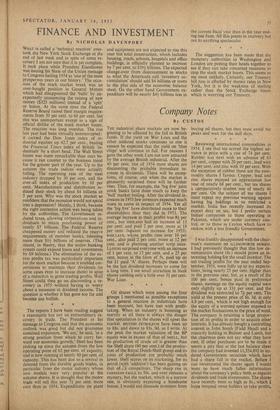FINANCE AND INVESTMENT
By NICHOLAS DAVENPORT
WHAT is called a 'technical reaction' over- took the New York Stock Exchange at the end of last week and in spite of some re- covery I am not sure that it is yet complete. It took place while President Eisenhower was issuing his State of the Union message to Congress hailing 1954 as 'one of the most prosperous years in our history.' The occa- sion of the stock market break was an over-bought position in General Motors which had disappointed the 'bulls' by un- expectedly announcing the raising of new money ($325 millions) instead of a 'split' or bonus. At the same time the Federal Reserve Board raised their margin require- ments from 50 per cent. to 60 per cent. but this was unimportant except as a sign of official dislike of the stock market boom. The reaction was long overdue. The rise last year had been virtually uninterrupted : it carried the Dow Jones index of in- dustrial equities up 42.7 per cent., beating the Financial Times index of British 'in- dustrials' by a short head. The Wall Street boom was more remarkable than ours be- cause it ran counter to the business trend for the greater part of the year. Up to the autumn the trade indices were actually falling. The operating rate of the steel industry dropped by 30 per cent. and the over-all index of production by 10 per cent. Manufacturers and distributors re- duced their stock by about $4 billions or 5 per cent. Why was the stock market so confident that the recession would not spiral into a depression? Mainly, I think, because the right corrective action was being taken by the authorities. The Government re- duced taxes, allowing corporations and in- dividuals to retain purchasing power of nearly $7 billions. The Federal Reserve cheapened money and reduced the reserve requirements of member banks, releasing more than $11 billions of reserves. (This meant, in theory, that the entire banking system could expand loans and investments by $9 billions.) The elimination of the ex- cess profits tax was particularly important for the stock market because it enabled cor- porations to maintain their dividends lin some cases even to increase them) in spite of a reduction in gross trading profits. Wall Street could then go on discounting a re- covery in 1955 without having to worry about a recession in dividend income. The question is whether it has gone too far and becOme too bullish.
The reports I have been reading suggest a reasonable but not an extraordinary re- covery in trade. The President in his message to Congress said that the economic outlook was good but did not guarantee sustained expansion. 'We are,' he said, 'in a strong position from which to carry for- ward our economic growth.' Steel has been picking up since the autumn from the low operating point of 62 per cent. of capacity, and is now running at nearly 80 per cent. of capacity. This has been due to a revival in demand from the durable goods trades, in particular from the motor industry whose new models were very popular at the autumn shows. It is thought that the MOW trade will sell this year 74 per cent. more cars than in 1954. Expenditures on plant
and equipment are not expected to rise this year but total construction, which includes housing, roads, schools, hospitals and office buildings, is officially planned to increase by 7 per cent, to $394 billions. The expected change-over from disinvestment in stocks to what the Americans call 'inventory ac- cumulation' should add $4 billions or more to the plus side of the economic balance sheet. On the other hand Government ex- penditure will be nearly $41 billions less in the current fiscal year than in the year end- ing last June. All this points to recovery but not to anything spectacular.
The suggestion has been made that the monetary authorities in Washington and London are putting their heads together to see if they can take concerted measures to stop the stock market boom. This seems to me most unlikely. Certainly, our Treasury bill rate is affected by money rates in New York, but it is the weakness of sterling rather than the Stock Exchange boom which is worrying our Treasury.


































 Previous page
Previous page